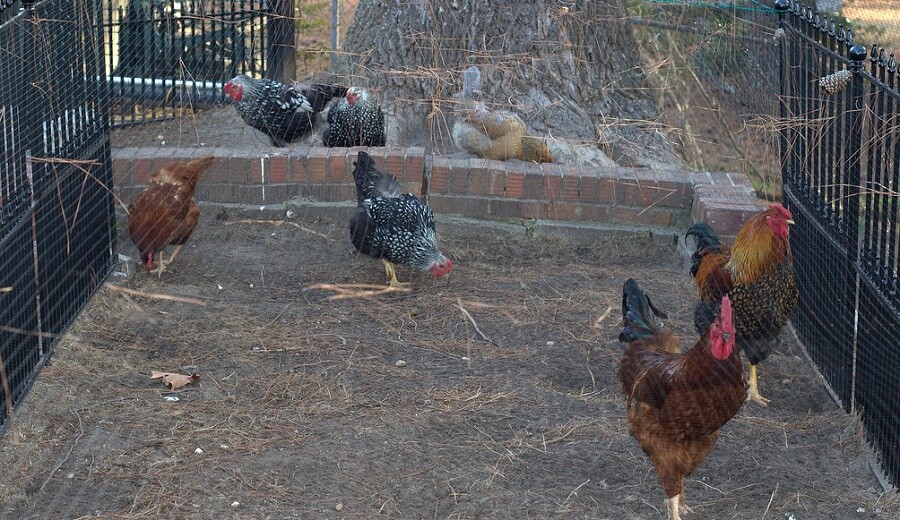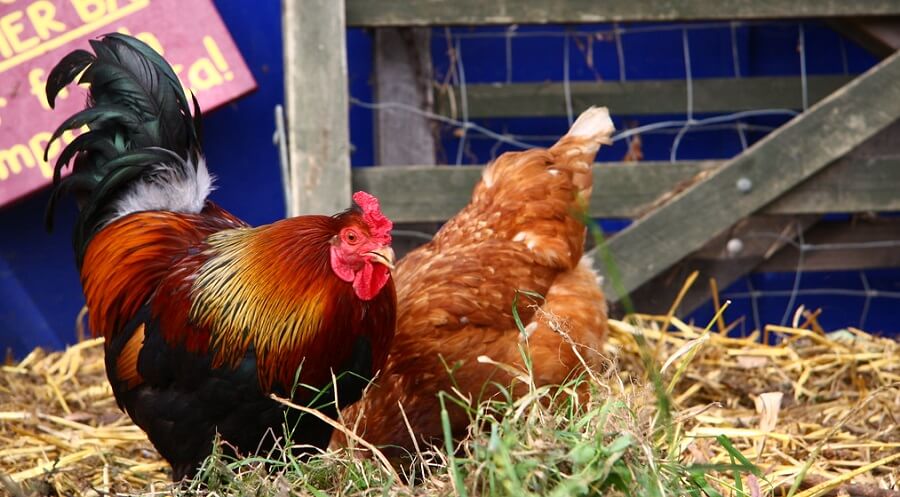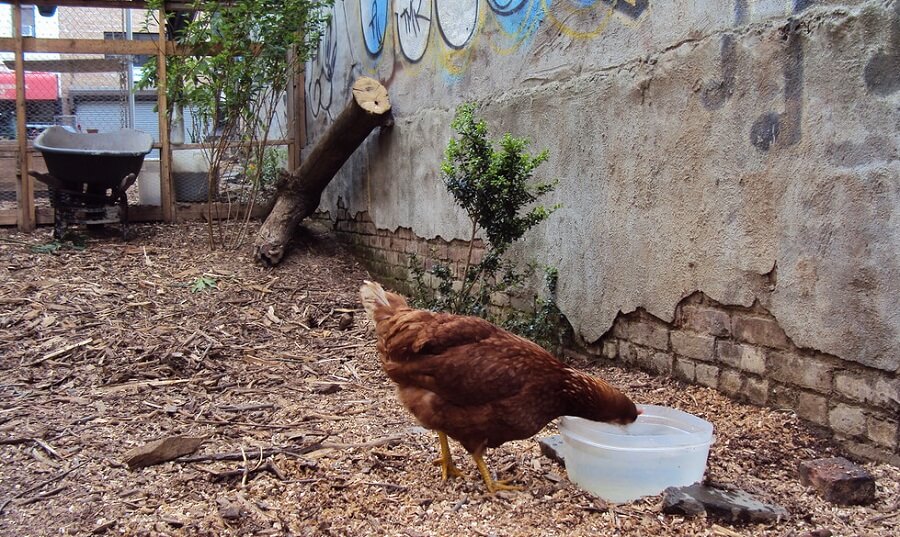A recent trend has made it possible for many urban residents to raise chickens. Chicken raisers live in Las Angeles, New York, and Chicago. As cities modify neighborhood codes and rules, chickens are becoming legal.
Plus, awareness about food and sustainable living has helped to create greater interest among city dwellers who want to see where their food comes from and participate in responsible practices.
If you are looking to raise chickens, either for eggs or meat and you live in a city, there are many breeds of chickens that thrive in smaller spaces. Even small condo yards can provide enough room for a few chickens to thrive.
This article will cover how you can raise chickens in a city or small yard, as well as what breeds are the best for small spaces.
Understand City Laws and Ordinances Regarding Chickens
Every city and suburban will have its own rules regarding raising chickens. Before you adopt a flock of your own, make sure that it is legal where you live. You may need to check your HOA rules as well.
If your area doesn’t allow chickens, then check out this section for ideas on how to get chickens legalized.
Most areas that do allow hens for residents have restrictions on roosters. Roosters are generally more aggressive and louder than hens are. Make sure that you have the authority to raise roosters before you adopt any male chicks.
Other restrictions may exist for specific breeds of chickens that are louder. So make sure that you purchase breeds that are allowed where you live.
Even small condo yards can usually house 2-3 chickens happily. But, the chickens chosen need to be a breed that doesn’t need as much space to be happy.
Lastly, if you raise meat chickens in the city, or if you are raising eggs to egg hens, you will need to find out the rules for butchering.
Hatching eggs will mean that you end up with the forbidden rooster. As a result, you’ll need a way to either adopt him out or to butcher him. The same thing will apply if you choose to raise meat chickens.
Many cities restrict backyard butchering so you will want to find a local farmer or butcher who will humanely do the job for you.
Many urban areas require
Lastly, make sure that you get a copy of the ordinances in your area so that you have them for reference if there are any issues.
- Make sure chickens are allowed by city ordinance
- Roosters are often restricted
- Certain loud chicken breeds may be restricted
- On-site butchering is often forbidden
- Some HOA rules may restrict or limit coop size and features
- Some cities may require rodent-proof feed containers
- Get a copy of the ordinances for your records
If you are searching for city ordinances there are a few places to check. First, check under the Animals section. That section usually lists prohibited animals such as poisonous or exotic pets.
Next, check the zoning section. That will usually tell you what animals and how many are allowed in a specific area. Try searching for “fowl” “chickens” and “poultry.”

Questions To Ask Your City Officials
There are many things you will need to know when raising chickens. Asking the right questions before you get started can save you fines, penalties, and other restrictions by city officials.
In some cases, you may need a permit or to follow specific rules regarding your chicken coop and feeding practices.
- How many birds are allowed per family?
- What restrictions on breeds exist?
- Are roosters allowed in city limits?
- What rules on the coop exist?
- Are there restrictions on the size or placement of the coop?
- Do I need a permit to raise chickens or to build a coop?
- Do I need a permit if I choose to sell the eggs?
- Who can I contact if I have to get rid of my chickens unexpectedly?
Talk To Your Neighbors
In an urban environment, closer homes and buildings can mean more conflict over chickens. One of the best ways to avoid issues with neighbors is to talk to them before you get chickens.
Educate them on the quietness of chickens and on the fact that hens won’t crow like roosters.
Discuss any concerns they may raise and work to overcome them.
By involving your neighbors, you may build new friendships and foster conversation that benefits the whole community.
Plus, sharing the eggs once in a while will likely also help to improve relations.
How Much Space Do Chickens Need?
Another consideration is how much space each chicken needs. The exact amount that your chickens need will vary depending on whether or not you have bantams and the breed you choose. It will also make a difference if you keep them in a coop and run all day or if you let them out to free-range.
If your chickens are free ranged during the day, then you don’t need as much space in the coop. 1-2 feet per chicken will be enough. Many cities will have a minimum square footage per chicken. 2 feet is ideal for a free-range chicken.
If you don’t let your chickens free-range, then you should allow at least 6-10 square feet per chicken inside the coop and run.
If you choose chickens that need more space or are more aggressive, then having your chickens too crowded will lead to bullying. If you see bullying and aggressive chickens picking on others in the flock, check out this article to find out how to reduce bullying.
Bullying is usually a sign of stress. You know your chickens are stressed if there is excessive pecking. If smaller chickens are unable to eat or drink because of the aggressiveness of other chickens, then bullying is too great. You may also notice feather gaps or that some chickens seem afraid of other chickens in the flock.
Benefits Of Raising Chickens In The City
Raising chickens in the city may seem like a hassle. You have more neighbors to deal with, city government, and possibly more restrictions.
But, there are many benefits to overcoming the obstacles of raising a farm animal in the city.
- Backyard chicken eggs have more vitamin E, A, and Omega 3 fatty acids than factory eggs
- They taste a LOT better
- Raising chickens helps to overcome the divide between diet and food production
- It’s educational for children
- It teaches responsibilities
- Chickens make a great pet and some breeds will bond very strongly to human owners
- Chickens can provide food security for low-income families
- They provide high-quality fertilizer for gardeners
- They control flies and bugs without insecticide. They also eat table scraps that could end up in the landfill.

Protect Your Chickens From City Predators
The city has different predators than in the country. While country life may include the need to protect your chickens against cougars, coyotes, and wolves, city life has its own unique predators.
Make sure that you take adequate measures to protect your flock against potential enemies. Let’s cover the most common predators to your flock:
Dogs Love To Eat Chickens
Wild dog packs have become increasingly common in large cities. The population of dog packs raised ten years ago with the housing crisis. These dog packs can decimate a flock of chickens overnight.
But, even tame dogs can be a danger to your chickens. After all, chickens make a tasty dinner. Too often, friendly neighborhood dogs have killed or badly maimed chickens.
You can protect your birds by making sure that you have a strong, high fence to protect them.
Raccoons Are A Devious Chicken Predator
Raccoons are found almost everywhere. They may be cute, but they are also a deadly predator. Raccoons are incredibly strong and they are smart.
My friend once lost a chicken to a raccoon who pulled the adult bird through chicken wire. It wasn’t pretty.
Plus, raccoons can undo many latches and hooks that you may use to protect or lock up your coop. The general rule of thumb is that a raccoon can get into anything a two-year-old can get into.
You can protect your chickens by making sure there are no openings that are more than 1 inch. ½ inch openings are ideal. Chicken wire is not as safe for chickens as hardware cloth. Also, make sure that your chickens have a place to sleep that has a solid wall.
Even when I use chicken tractors, I keep half of it covered with a tarp or plywood covering. That gives my ladies a place to run and safely sleep at night without a raccoon being able to reach in and grab one.
Rats Are An Invisible Predator To Chickens
Rats can on occasion eat your chickens. They will definitely eat your pullets and half-grown chickens. They will also steal and eat your chicken eggs.
There are two important steps to protect your chickens from rats. First, make sure that there aren’t any animal burrows into your chicken coop. You can do this by buying fencing 1-2 foot deep or by spreading it out in a coop skirt. This will keep animals from digging to get into the coop.
Secondly, you should use rodent-proof feeders. This will help to reduce the mess and waste of your chicken feed and help to not attract rodents to the coop.
Hawks Are A Forgotten Predator For Chickens
Hawks can be found nearly everywhere. They abound in big cities. Although many hawks don’t look that big when flying, they are incredibly strong.
A hawk can usually carry off a chicken, even though a full-grown chicken looks bigger than the hawk.
If by some chance, the hawk isn’t successful, your chicken is probably still injured and may die.
You can protect your girls from sky attacks by stringing fishing wire or orange string in a criss-cross pattern across your coop or backyard.
The Hawks will see the reflection, but won’t be able to gauge distance on the string. It will also be difficult for them to tell if there is room to fly.
As a result, they will keep away from your chickens.
People Are A Dangerous Enemy
Sadly, even humans can be predators to your chickens. Angry neighbors can complain and cause such a ruckus that your flock is in danger and you might be forced to get rid of the birds.
Passersby can throw rocks, kick or otherwise harm your chickens.
I have even heard of people stealing chickens from neighbor’s coop.
You can help to protect your chickens by keeping a good dialogue going between your neighbors and you.
Consider using fencing that can block or protect your flock from passersby. Use a lock that will protect your coop at night.
These are just a few ways that you can protect your chickens. For more detailed information on keeping your flock safe check out this article or this information on fences.
How To Get Chickens Approved In Your City
If you have found out that chickens aren’t allowed in your city, there are several steps you can take to work toward getting them approved.
You will probably need to fill out paperwork. Check other cities and suburbs around your area to see if any of them have ordinances that allow backyard chickens.
Use their laws and ordinances as an example to draft suggested legislation for your city council. Call the city offices and ask to have your proposal put on the agenda.
Talk to other chicken lovers around the country and draft a list of benefits to raising chickens. Connect with other poultry lovers vía facebook, neighborhood canvassing and other methods to gain support for the proposed law. Talk to animal rights groups, gardening clubs, and environmental groups to find allies.
Put together all the information you’ve gathered into an informative packet.
Show community support and get as many others out to the city council meeting to support your proposal. Ask the local newspaper to feature an article about the issue and council meetings.
You will probably need to attend multiple city council meetings.
Expect the process to take a while. Stay friendly and informative and it can be done!
Chicken Breeds That Are Ideal In The City
There are several factors in choosing the right chicken breed. You’ll want to decide if you want meat or egg chickens. You will also want to make sure that the breed you choose will do well in your climate. Specific breeds do better in wet conditions, hot, or cold conditions.
The best chicken breeds for limited space and city living are:
- Ameraucana & Easter Eggers: Friendly calm chickens that do well in small spaces.
- Australorps: Very mellow chickens, and not great fliers so they won’t get out as easily.
- Barnevelder chickens: Quiet chickens that don’t fly well over fences.
- Black Star: They are noisy when they lay an egg. They are cuddly and not nervous.
- Buff Orpington: Docile chickens that are and best suited for a small yard.
- Coche Bantam: You need the bantam version otherwise they are too large for city lots. They are gentle and mellow
- Crevecoeur: Good with less space. Not active chickens, but great for first timers.
- Dominique: Super adaptable chickens. They are very relaxed.
- Golden Comet: Adaptable birds that aren’t easily rattled by pets or kids.
- Houdan: Gentle chickens that take confinement well.
- Lohmann Brown: Named the “best backyard chicken.” They are friendly and adaptable.
- New Hampshire: Quiet and adaptable chickens that are happy almost anywhere.
- Barred Rock, aka Plymouth Rock: Good foragers that are adaptable and friendly.
- Polish: Super shy and timid birds. They do good in confinement.
- Rhode Island Red: These birds are laid back and thrive anywhere.
- Silkie Bantams: The best chicken for indoor apartment living. They are mild and friendly.
- Sultan: These chickens are often raised indoors or in a large cage. They don’t require sunlight and outdoor time to be happy.
- Speckled Sussex: They don’t mind kids or small spaces. Their ancestors were used to small ancient Roman streets.
- Naked Neck Turken: Birds that don’t stress easily. They take confinement well.
- Welsummer: They also take small space well, but can be noisy.
Raising Chickens In Apartment Living
It may sound crazy to some people, but a number of chicken raisers raise chickens indoor in apartments.
The varieties that do the best is the Silkie Bantams and the Sultans. Other varieties, especially bantams are also popular indoors.
Of course, you will want to have chicken diapers on hand to keep your living area clean. You will probably want to also designate chicken areas in your apartment.
If you do choose to raise chickens in an apartment, then consider using your balcony if you have one. This will give your ladies outdoor space and sunlight.
You should also mimic the outdoors as much as possible. Provide them with edible potted plants, a nesting box, and dirt to dust bathe in. Some people use Rubbermaid containers that have dirt and grass in the bottom for the chickens to play in.
Buy mealworms and bugs and put them in the dirt bins for your hens to find.
Conclusion
Not only is it possible, but it is also rewarding and fun to raise chickens in the city. Many chicken breeds are well suited for confined spaces and quiet enough to not bother your neighbors.
While many people have cats and dogs as pets, chickens also make great pets and provide other benefits such as eggs and environmental positives with the soil.
If you live in a city that has an extreme climate, be sure to check out how to care for chickens in cold weather or in hot weather.
Feature Image Photo Credit: Flickr Pasa47
My Favorite Chicken and Duck Supplies
This list contains affiliate products. Affiliate products do not cost more but helps to support BestFarmAnimals and our goal to provide farm animal owners with accurate and helpful information.
Manna Pro Oyster Shell keeps eggs strong. Before I gave my chickens oyster shell, I had the oddest eggs, many with weak and irregular shells. Now, I don’t have an issue.
Layer Feed by Manna Pro. I like pellets rather than crumbles as my chickens eat them better and less gets wasted or scavenged by rodents. A good layer feed makes the difference in hens laying many more eggs.
My chickens love this mealworm treat, which gives added protein, something that’s great during molting and winter months.
There are many ways to feed and water your chickens. I like this food and water setup the best because it reduces waste, saves me time feeding and watering, and keeps the food fresh longer. Except, in the winter, I use a heated waterer. The only problem is the heated waterers need to be replaced every few years.
I love this chicken veggie hanger. It makes it easy to give your chickens produce from the garden and keep them occupied in the winter with a fresh head of lettuce.
These chicken toys are a hoot! They will help curb bullying and keep your chickens active, especially in the winter when hens tend to get more lethargic.

